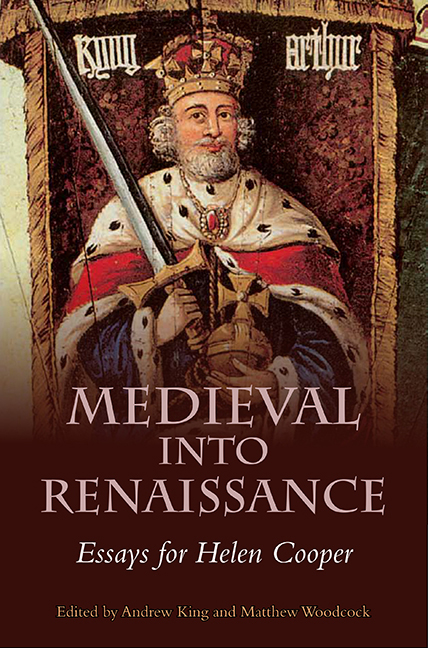Book contents
- Frontmatter
- Contents
- List of Illustrations
- List of Contributors
- Acknowledgments
- Abbreviations
- Introduction
- Unknowe, unkow, Vncovthe, uncouth: From Chaucer and Gower to Spenser and Milton
- Armour that doesn't work: An Anti-meme in Medieval and Renaissance Romance
- ‘Of his ffader spak he no thing’: Family Resemblance and Anxiety of Influence in Fifteenth-Century Prose Romance
- Writing Westwards: Medieval English Romances and their Early Modern Irish Audiences
- Penitential Romance after the Reformation
- The English Laureate in Time: John Skelton's Garland of Laurel
- Thomas Churchyard and the Medieval Complaint Tradition
- Placing Arcadia
- Fathers, Sons and Surrogates: Fatherly Advice in Hamlet
- ‘To visit the sick court’: Misogyny as Disease in Swetnam the Woman-Hater
- The Monument of Uncertainty: Sovereign and Literary Authority in Samuel Sheppard's The Faerie King
- Mopsa's Arcadia: Choice Flowers Gathered out of Sir Philip Sidney's Rare Garden into Eighteenth-Century Chapbooks
- Bibliography
- Index
- A Bibliography of Helen Cooper's Published Works
- Tabula Gratulatoria
Unknowe, unkow, Vncovthe, uncouth: From Chaucer and Gower to Spenser and Milton
Published online by Cambridge University Press: 05 July 2016
- Frontmatter
- Contents
- List of Illustrations
- List of Contributors
- Acknowledgments
- Abbreviations
- Introduction
- Unknowe, unkow, Vncovthe, uncouth: From Chaucer and Gower to Spenser and Milton
- Armour that doesn't work: An Anti-meme in Medieval and Renaissance Romance
- ‘Of his ffader spak he no thing’: Family Resemblance and Anxiety of Influence in Fifteenth-Century Prose Romance
- Writing Westwards: Medieval English Romances and their Early Modern Irish Audiences
- Penitential Romance after the Reformation
- The English Laureate in Time: John Skelton's Garland of Laurel
- Thomas Churchyard and the Medieval Complaint Tradition
- Placing Arcadia
- Fathers, Sons and Surrogates: Fatherly Advice in Hamlet
- ‘To visit the sick court’: Misogyny as Disease in Swetnam the Woman-Hater
- The Monument of Uncertainty: Sovereign and Literary Authority in Samuel Sheppard's The Faerie King
- Mopsa's Arcadia: Choice Flowers Gathered out of Sir Philip Sidney's Rare Garden into Eighteenth-Century Chapbooks
- Bibliography
- Index
- A Bibliography of Helen Cooper's Published Works
- Tabula Gratulatoria
Summary
My discussion, which owes a great deal to the work of Helen Cooper, begins with E.K.'s remarks on the 1579 edition of The Shepheardes Calender. Edmund Spenser is not named in this book, but he is in subsequent early editions and in modern editions. The first substantive point that E.K. makes in his Epistle, which is directed to Gabriel Harvey, is that once the anonymous, ‘vncovthe’ author of the poem to follow is ‘covthe’ he will be irresistibly attractive to readers. The passage in question is well known, but because my analysis of it will be detailed, I reproduce it at length:
To the most excellent and learned both Orator and Poete, Mayster Gabriell Haruey, his verie special and singular good frend E.K. commendeth the good lyking of this his labour, and the patronage of the new Poete.
VNCOVTHE VNKISTE, Sayde the olde famous Poete Chaucer: whom for his excellencie and wonderfull skil in making, his scholler Lidgate, a worthy scholler of so excellent a maister, calleth the Loadestarre of our Language: and whom our Colin clout in his glogue calleth Tityrus the God of shepheards, comparing hym to the worthines of the Roman Tityrus Virgile. Which prouerbe, myne owne good friend Ma. Haruey, as in that good old Poete it serued well Pandares purpose, for the bolstering of his baudy brocage, so very well taketh place in this our new Poete, who for that he is vncouthe (as said Chaucer) is vnkist, and vnknown to most men, is regarded but of few. But I dout not, so soone as his name shall come into the knowledg of men, and his worthines be sounded in the tromp of fame, but that he shall be not onely kiste, but also beloued of all, embraced of the most, and wondred at of the best.
The word ‘covth’, shunted aside here by the prefix ‘vn-’, is an archaism, one of the ‘olde and obsolete words […] most vsed of country folke’ that Spenser draws upon for the poetry of the Calender, in order, E.K. says, to bring ‘auctoritie to the verse’.
- Type
- Chapter
- Information
- Medieval into RenaissanceEssays for Helen Cooper, pp. 15 - 34Publisher: Boydell & BrewerPrint publication year: 2016

